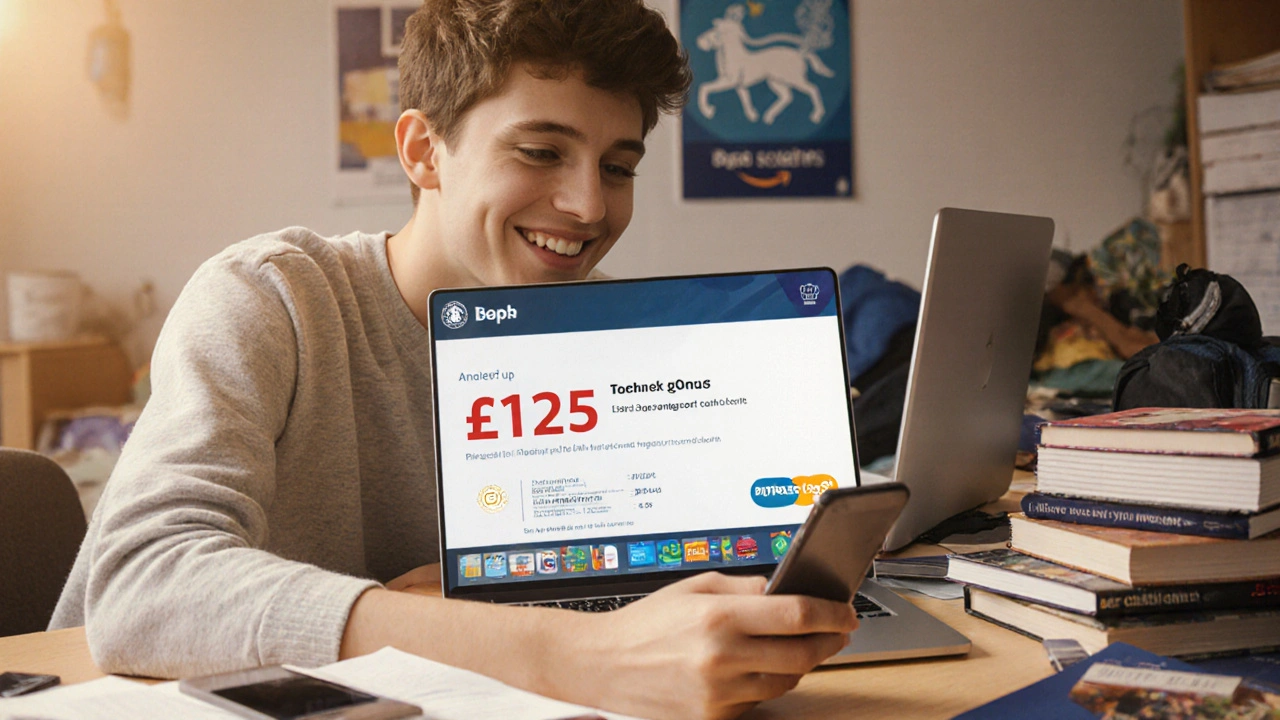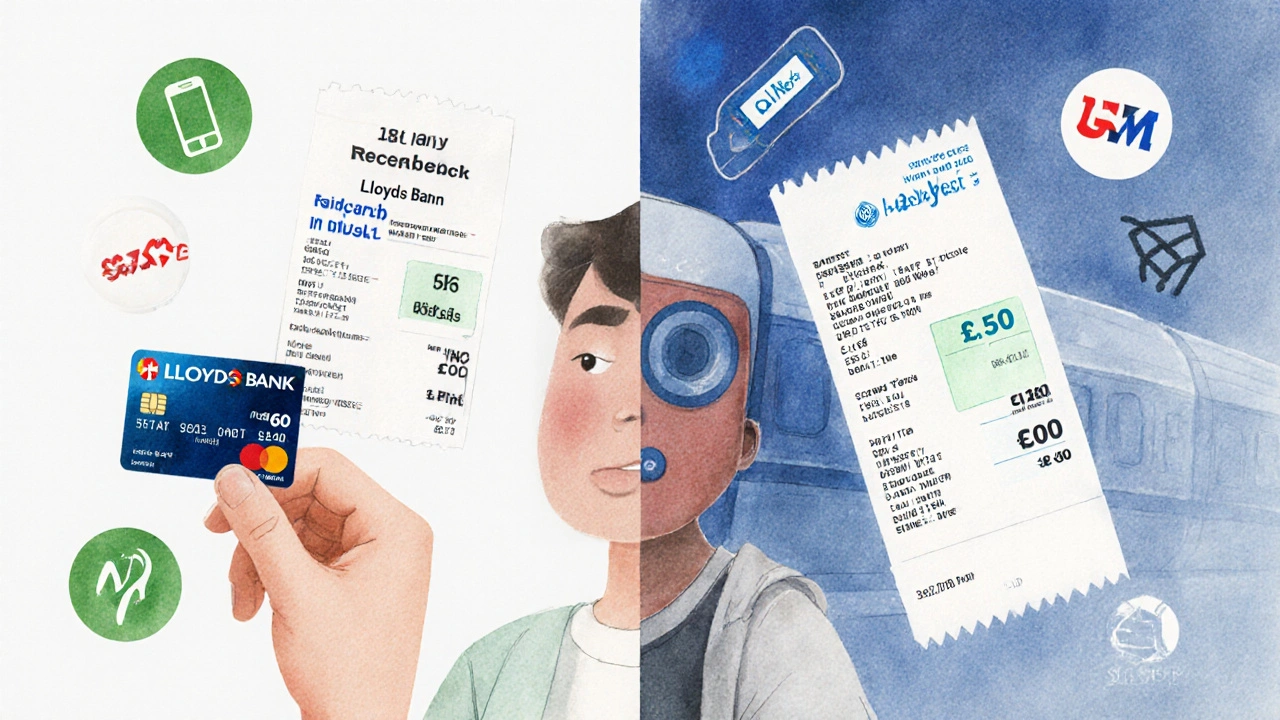
If you're a student in the UK, opening a bank account isn't just about storing cash-it's about unlocking real money-saving perks most people don't even know exist. From interest-free overdrafts to railcard discounts and cashback on groceries, student bank accounts are designed to make life cheaper while you study. And yes, these aren't just marketing gimmicks. These are real, usable benefits that can save you hundreds a year-if you pick the right one.
Why Student Bank Accounts Are Different
Most current accounts in the UK charge fees, require minimum deposits, or offer low interest. Student accounts? They're built differently. Banks know you're on a tight budget, so they offer incentives that directly match your spending habits. You won't find these perks on regular accounts. They're exclusive to students enrolled in a UK university or college course.The biggest draw? Interest-free overdrafts. While most adults pay high fees for going overdrawn, students can get up to £3,000 interest-free, depending on the bank and your year of study. Some even increase your overdraft limit each year, as long as you stay enrolled. That’s not just convenience-it’s a financial safety net.
Top 5 Free Student Bank Accounts in the UK (2025)
Here are the five most popular student accounts right now, based on overdraft limits, cashback, and added perks. All are free to open, require no monthly fees, and are available to full-time students aged 17+.| Bank | Interest-Free Overdraft | Key Perks | Eligibility |
|---|---|---|---|
| Barclays | Up to £3,000 (increases to £4,000 in Year 3) | 1-year free O2 mobile plan, £100 cash bonus for direct debit setup | Full-time student, 17+ |
| Lloyds Bank | Up to £3,000 (up to £4,500 in final year) | 18-25 Railcard (50% off train tickets), £100 cash bonus | Full-time student, 17+ |
| NatWest | Up to £3,000 (up to £4,000 in final year) | Free 1-year Student Amazon Prime, £100 cash bonus | Full-time student, 17+ |
| HSBC | Up to £3,000 (up to £4,000 in final year) | £100 cash bonus, free student travel insurance | Full-time student, 17+ |
| Santander | Up to £3,000 (up to £4,000 in final year) | 15% cashback on spending at supermarkets, £125 cash bonus | Full-time student, 17+ |
Each bank offers a £100-£125 sign-up bonus, but only if you set up a direct debit and meet minimum deposit requirements. These bonuses are real money you can use for textbooks, rent, or a weekend trip. Don’t ignore them-many students miss out because they don’t read the fine print.
What You’re Really Getting Beyond the Cash
The overdraft is the headline, but the real value is in the hidden perks. Take Santander’s 15% cashback on supermarket spending. If you spend £50 a week on groceries, that’s £7.50 back every week. Over a year? That’s £390. That’s almost half the cost of a student railcard.Lloyds and NatWest include the 18-25 Railcard. A standard railcard costs £30 a year and gives you one-third off train tickets. With a student account, it’s free. That means a £60 return ticket to see family becomes £40. Over three years, that’s hundreds saved.
Barclays’ free O2 plan is worth £120 a year. You get unlimited data, calls, and texts on a decent plan. If you’re paying for mobile separately, this alone covers the cost of switching banks.
HSBC’s travel insurance is another underrated perk. Most student policies cost £50-£100 a year and cover lost luggage, trip cancellations, and medical emergencies abroad. If you travel for holidays or study abroad, this is worth more than the cash bonus.

How to Choose the Right One
Don’t pick the bank with the biggest overdraft or the biggest bonus. Pick the one that matches your lifestyle.- If you travel by train often → Lloyds or NatWest (free railcard)
- If you shop at Tesco, Sainsbury’s, or Asda regularly → Santander (15% cashback)
- If you use your phone a lot → Barclays (free mobile plan)
- If you need travel insurance → HSBC
- If you want the most cash upfront → Santander (£125) or Barclays (£100 + free phone)
Also check if the bank has branches near your campus. You might not think you’ll need them, but if you need to deposit a cheque or get help with fraud, being able to walk in saves hours.
What You Must Avoid
Student accounts are great-but they come with traps.- Don’t max out your overdraft. Just because it’s interest-free doesn’t mean it’s free money. Banks can reduce or remove your overdraft if you miss payments or drop out. You’ll still owe it.
- Don’t switch too often. Most banks require you to stay for at least a year to keep your bonus. Switching early means losing it.
- Don’t assume all perks last forever. Railcards and Amazon Prime expire after a year. You’ll need to renew them manually.
- Don’t open multiple accounts. Banks share data. If you apply for more than one student account, they’ll likely reject you.
Also, remember: once you graduate, your student account turns into a regular current account. Your overdraft will start charging interest-usually 15-20% APR. Plan ahead. Start paying it down before you finish.

How to Open One
It’s simple:- Check you’re eligible: full-time student, aged 17+, studying at a UK institution
- Gather your documents: student ID, UCAS confirmation letter, proof of address (utility bill or tenancy agreement)
- Apply online or in-branch: most banks let you start the process on their website
- Set up your direct debit: this unlocks your bonus
- Activate your perks: download the railcard app, sign up for Amazon Prime, or activate your mobile plan
You can apply as early as June before your course starts. Some banks even let you open an account before you receive your student ID-just use your offer letter.
What Happens After Graduation?
Your student account doesn’t vanish. It converts to a graduate account. Most banks offer 1-3 years of continued interest-free overdraft, but at a reduced limit. After that, you’ll need to move to a standard account.Use this transition time wisely. Pay off your overdraft. Build a credit history. Start saving. Many banks offer free financial advice to graduates-take it.
Don’t wait until you’re broke to think about repayment. Even paying £50 a month after graduation cuts years off your debt and keeps your credit score clean.
Can I open a student bank account if I’m part-time?
No. Most UK student bank accounts require you to be enrolled full-time. Part-time students don’t qualify for the overdrafts or perks. You can still open a regular current account, but you won’t get the student-specific benefits.
Do I need a UK address to open a student account?
Yes. All banks require proof of a UK address-usually a tenancy agreement, utility bill, or official university letter. If you’re an international student, your university accommodation letter usually works. You’ll also need your passport and visa documents.
Can I switch banks after opening a student account?
Yes, but you’ll lose your sign-up bonus if you switch before the required period-usually 6 to 12 months. Also, banks can see if you’ve had another student account, and may refuse your application if you’ve already claimed a bonus elsewhere.
Are student bank accounts safe?
Yes. All UK banks are protected by the Financial Services Compensation Scheme (FSCS), which covers up to £85,000 per person per bank. Your money is as safe as it would be in any other UK bank account.
What if I drop out of university?
Your student account will be reviewed. You’ll likely lose your overdraft limit and perks. You’ll still owe any money you’ve borrowed, and interest may start charging. Contact your bank immediately to discuss repayment options.